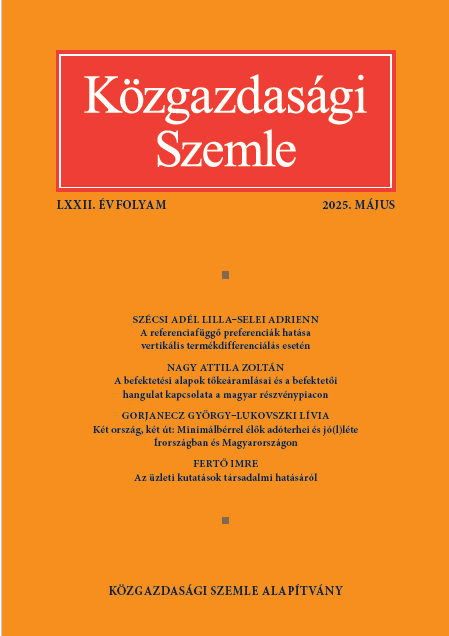On the societal impact of business research
Abstract
The societal impact of business research has so far remained limited, in part due to contradictions within economic and institutional frameworks, as well as internal barriers in the research community. While market mechanisms prioritize short-term profit and academic workshops aspire to high levels of theoretical rigour, the question of social benefit often becomes stuck between these dual demands. Focusing on Responsible Management Education (RME), social entrepreneurship, and corporate social responsibility (CSR), this study sheds light on how to forge a closer link between theory and practice. It identifies the challenges posed by “soft” funding conditions and difficult-to-compare metrics, and emphasizes that long-term results can only be achieved by promoting interdisciplinary collaboration, ethical and reflective research practices, and broad stakeholder engagement. The author concludes that business research can genuinely fulfil its transformative role only if the relevant institutions–whether public, market-based, or academic–coordinate and purposefully shape their incentives, thereby creating opportunities for innovations that are both theoretically robust and socially beneficial.
References
AUDRETSCH, D. B.–BELITSKI, M.–GUERRERO, M.–SIEGEL, D. S. [2022]: Assessing the impact of the UK’s Research Excellence Framework on the relationship between university scholarly output and education and regional economic growth. Academy of Management Learning & Education, 21. évf. 3. sz. 394–421. o. https://doi.org/10.5465/amle.2021.0240
AVELAR, A. B. A.–MICHELL, S. F.–SANDES-GUIMARÃES, L. V. [2025]: Integrating sustainable development goals in management education: Impact on student knowledge, attitudes, and behaviors. The International Journal of Management Education, 23. évf. 2. sz. 101116. https://doi.org/10.1016/j.ijme.2024.101116
BACQ, S.– HERTEL, C.–LUMPKIN, G. T. [2022]: Communities at the nexus of entrepreneurship and societal impact: A cross-disciplinary literature review. Journal of Business Venturing, 37. évf. 5. sz. 106231. https://doi.org/10.1016/j.jbusvent.2022.106231
BASTOW, S.–DUNLEAVY, P.–TINKLER, J. [2014]: The impact of the social sciences: How academics and their research make a difference. SAGE Publications, Thousand Oaks, CA.
BŐGEL GYÖRGY–MÁTYÁS LÁSZLÓ [2020]: Kis pénz, nagy teljesítmény? A hazai tudományos kutatás versenyképességéről. Közgazdasági Szemle, 67. évf. 1. sz. 88–102. o. http://dx.doi.org/10.18414/KSZ.2020.1.88
BURCHELL, J.–KENNEDY, S.–MURRAY, A. [2014]: Responsible management education in UK business schools: Critically examining the role of the United Nations Principles for Responsible Management Education as a driver for change. Management Learning, 46. évf. 4. sz. 479–497. o. https://doi.org/10.1177/1350507614549117
CHEN, S.–SHARMA, G.–MUÑOZ, P. [2023]: In pursuit of impact: From research questions to problem formulation in entrepreneurship research. Entrepreneurship Theory and Practice, 47. évf. 2. sz. 232–264. o. https://doi.org/10.1177/10422587221111736
CSABA LÁSZLÓ [2023]: A mindenséggel mérd magad! Educatio, 32. évf. 3. sz. 385–395. o. https://doi.org/10.1556/2063.32.2023.3.2
DOBOS IMRE–MICHALKÓ GÁBOR–SASVÁRI Péter [2020]: Messze még a híd? Kelet-Közép-Európa gazdaságtudományi kutatóinak összehasonlítása. Statisztikai Szemle, 98. évf. 8. sz. 981–1000. o. https://doi.org/10.20311/stat2020.8.hu0981
HEGYI PÁL [2025]: Interjú Gulyás Balázzsal, a HUN-REN Magyar Kutatási Hálózat elnökével, valamint vezérigazgatójával, Jakab Rolanddal. Magyar Tudomány, 186. évf. 1. sz. 141–153. o. https://doi.org/10.1556/2065.186.2025.1.17
HERNANDEZ, M.– HAACK, P. [2023]: Theorising for positive impact. Academy of Management Review, 48. évf. 3. sz. 371–378. o. https://doi.org/10.5465/amr.2023.0180
HOWARD-GRENVILLE, J. [2021]: Caring, courage and curiosity: Reflections on our roles as scholars in organizing for a sustainable future. Organization Theory, 2. évf. 1. sz. https://doi.org/10.1177/2631787721991143
KRAJCSÁK ZOLTÁN–SZABÓ ISTVÁN [2021]: A megbízható és objektív publikációs teljesítménymérés szükségessége: a gazdálkodástudományok igénye a változásra és a tudomanymetria.com projekt. Vezetéstudomány–Budapest Management Review, 52. évf. 12. sz. 31–39. o. https://doi.org/10.14267/VEZTUD.2021.12.04
MACINTOSH, R.–MACLEAN, D.–O’GORMAN, K. D. [2017]: Impact and management research: Exploring relationships between temporality, dialogue, reflexivity, and praxis. British Journal of Management, 28. évf. 1. sz. 3–13. o. https://doi.org/10.1111/1467-8551.12207
PHILLIPS, P. A.–PAGE, S. J.–SEBU, J. [2023]: Business and management research themes and impact. Emerald Open Research, 1. évf. 4. sz. https://doi.org/10.1108/EOR-04-2023-0008
POST, C.–MUZIO, D.–SARALA, R.–WEI, L.–FAEMS, D. [2021]: Theorising diversity in management studies: New perspectives and future directions. Journal of Management Studies, 58. évf. 8. sz. 2003–2023. o. https://doi.org/10.1111/joms.12779
RAO-NICHOLSON, R.–RODGERS, P.–KHAN, Z. [2018]: Bridging the gap between domain of research and locus of impact: An examination of the UK’s Research Excellence Framework. Journal of Management Development, 37. évf. 4. sz. 41–352. o. https://doi.org/10.1108/JMD-02-2017-0051
REDGRAVE, S. D. J.–GRINEVICH, V.–CHAO, D. [2023]: The relevance and impact of business schools: In search of a holistic view. International Journal of Management Reviews, 25. évf. 2. sz. 340–362. o. https://doi.org/10.1111/ijmr.12312
RODE, J.–HEINZ, N.–CORNELISSEN, G.–MENESTREL, M. [2021]: How to encourage business professionals to adopt sustainable practices? Experimental evidence that the “business case” discourse can backfire. Journal of Cleaner Production, 283. sz. 124618. https://doi.org/10.1016/j.jclepro.2020.124618
SCHLÜTTER, D.–SCHÄTZLEIN, L.–HAHN, R.–WALDNER, C. [2023]: Missing the impact in impact investing research – A systematic review and critical reflection of the literature. Journal of Management Studies, 61. évf. 6. sz. 2694–2718. o. https://doi.org/10.1111/joms.12978
TIHANYI, L. [2020]: From “that’s interesting” to “that’s important”. Academy of Management Journal, 63. évf. 2. sz. 329–331. o. https://doi.org/10.5465/amj.2020.4002
TIMMING, A. R.–MACNEIL, J. [2023]: Bridging human resource management theory and practice: Implications for industry‐engaged academic research. Human Resource Management Journal, 33. évf. 3. sz. 592–605. o. https://doi.org/10.1111/1748-8583.12523
TSANG, E. W. [2022]: That’s interesting! A flawed article has influenced generations of management researchers. Journal of Management Inquiry, 31. évf. 2. sz. 150–164. o. https://doi.org/10.1177/10564926211048708
TSUI, A. S.–BITNER, M. J.–NETESSINE, S. [2023]: What topics should business school research focus on? Megjelent: Cornuel, E.–Thomas, H.–Wood, M. (szerk.): Perspectives on the Impact, Mission, and Purpose of the Business School. Routledge, London, 25–32. o.
VELTE, P. [2021]: Meta-analyses on corporate social responsibility (CSR): A literature review. Management Review Quarterly, 72. évf. 3. sz. 627–675. o. https://doi.org/10.1007/s11301-021-00211-2
WICKERT, C.–POST, C.–DOH, J. P.–PRESCOTT, J. E.–PRENCIPE, A. [2021]: Management research that makes a difference: Broadening the meaning of impact. Journal of Management Studies, 58. évf. 2. sz. 297–320. o. https://doi.org/10.1111/joms.12666
YAQUB, O.– MALKOV, D.–SIEPEL, J. [2023]: How unpredictable is research impact? Evidence from the UK’s Research Excellence Framework. Research Evaluation, 32. évf. 2. sz. 273–285. o. https://doi.org/10.1093/reseval/rvad019








